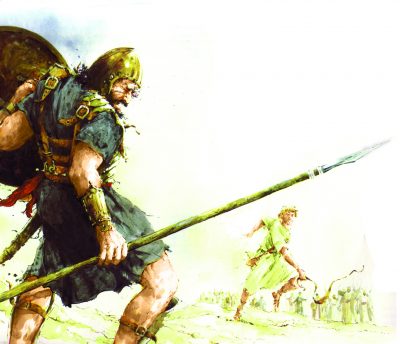
by: Charleeda Sprinkle, Assistant Editor
“He who dwells in the secret place of the Most High shall abide under the shadow of the Almighty.” Psalm 91:1
As I started to memorize Psalm 91, I could not get past the first verse. In fact, I could not get past the first few words: “He who dwells in the secret place…”Lord, show me where that secret place is. I want to live there, not just visit it.
I had just finished reading a Karen Kingsbury Christian fiction book, in which a character is a Hollywood movie star. He meets a “regular” girl, outside of Hollywood, and falls in love with her, but they are so hounded by the paparazzi (the photographers that follow famous people unmercifully) that they could not find a private place to be alone. They devise all kinds of tactics to outmaneuver the paparazzi. He disguises himself, and they use rented cars. Just when they are sure they are alone, they hear the click of a camera and see a paparazzi in the bushes or even above them in a helicopter! Thankfully, most of us do not have to live that way, and yet the demands of life that keep us from the “secret place” act like paparazzi in our lives.
However, it is not only the demands of life that keep us from that place, but also distractions. We have been conditioned by a world that loves to entertain us, so even when we have some time alone, we often turn the TV on or watch a movie on the VCR. Recently, I was house-sitting for someone who had just moved into a new place. There was no cable for TV, the VCR had not been unpacked, and there was no Internet connection, so I could not even check e-mail or write letters. I did not even have a good book to read. I knew I could turn on some worship music and read my Bible, but I wanted to be “entertained.” When the “paparazzi” were gone, I did not know how to live without them. How sad. Oh, God, cause my heart to gravitate to that private chamber (Song of Songs 1:4) that You have set aside just for You and me. Psalm 91 is a good place to start in understanding that place.
We do not know who wrote this psalm. Some say it was David, but Jewish tradition claims it was Moses. The mention of the plague in the psalm reminds the Jewish people of the plagues of Egypt, so it is often called the Song of Plagues. Also, the language of Deuteronomy 32, which Moses wrote, is very similar. The “secret place” in Hebrew is sayter(Strong’s #5643). It means a hiding, a covert in a mountain, a veil or covering, a protection, a defense, or a private or clandestine place. It comes from the verb that means to hide, keep close, conceal, or keep secret. Many Scriptures use this word though it is not always translated into English as “secret place”:“You are my hiding place” (Ps. 32:7); “I will trust in the shelter of your wings”(Ps. 61:4).
Psalm 91 tells us that the secret place is a refuge from enemy attacks, whether by day or by night. Some Jewish sages understand the terror, the arrow, the pestilence, and the destruction described in verses five and six as demons. So the psalm includes enemies from the spiritual realm. It is a reassuring psalm and a great one to have hidden in our hearts for the days ahead.
However, the many stories of Christians living under terrible persecution tell us that God does not always choose to keep His faithful ones from harm. So how are we to understand these words about God’s protection? While God always wants us to cry out to Him for protection and deliverance from our physical enemies, ultimately that secret place is the inner place.When Christian martyrs die, I believe they are in that secret place that no man can touch. Too often we focus on physical protection, so when God does not choose to protect, our faith is shaken. We need to focus on the secret place where no man, no enemy (natural or supernatural), can disturb or invade.
The Bible gives us many examples of people who knew that secret place. Through them, God teaches us what life is like in that place and what it is like when we act outside of it.
 Jewish tradition identifies the “secret place” as the cloud that Moses entered at the top of Mount Sinai (Exod. 24:18), and that is another reason why they think he wrote Psalm 91. There was probably no other man who experienced as close a connection with the Almighty as Moses. This secret place is a place where God speaks and we hear. God tells Moses, “Behold, I come to you in the thick cloud, that the people may hear when I speak with you” (Exod. 19:9).
Jewish tradition identifies the “secret place” as the cloud that Moses entered at the top of Mount Sinai (Exod. 24:18), and that is another reason why they think he wrote Psalm 91. There was probably no other man who experienced as close a connection with the Almighty as Moses. This secret place is a place where God speaks and we hear. God tells Moses, “Behold, I come to you in the thick cloud, that the people may hear when I speak with you” (Exod. 19:9).
It is a place where we see God and have fellowship with Him. At one point, God instructed Moses to bring Aaron, his sons, and the 70 elders up the mountain. There “they saw God, and they ate and drank”(Exod. 24:11). But after this, God called Moses up alone. “Then Moses went up into the mountain, and a cloud covered the mountain. Now the glory of the LORD rested on Mount Sinai, and the cloud covered it six days. And on the seventh day He called to Moses out of the midst of the cloud. The sight of the glory of the LORD was like a consuming fire on the top of the mountain in the eyes of the children of Israel. So Moses went into the midst of the cloud and went up into the mountain” (Exod. 24:15–18a). The secret place is where the glory of God rests.
The secret place is a place of intercession. After the golden calf incident, Moses returns to God to intercede for the people (Exod. 32:30). The Bible tells us that “the Lord spoke to Mosesface to face, as a man speaks to his friend” (Exod. 33:11). It is a place of intimacy. But this is not enough for Moses. He makes a bold request: “Show me Your glory” (v. 18). I, however, am so satisfied with so much less. How much more God has that I never dare ask for. It is also a place of worship(Exod. 34:8). When Moses comes down from the mountain after a second period of 40 days with God, the skin on Moses’s face shone (v. 30). It is a place where we can be in God’s presence and experience His glory.
But when Moses acted on his own outside the “glory place,” it cost him dearly. Numbers 20 tells us how God instructed Moses to speak to the rock for water. Instead Moses, in anger, struck the rock twice. He failed to manifest God’s compassionate character to the people. This was so important to God that He would not allow Moses to enter the Promised Land. Outside of the secret place, we fail to manifest God appropriately to others.
 As a shepherd boy, David spent most of his time on the lonely, quiet hillsides with his sheep and harp. Walking through the green valleys, beside the still waters, under a canopy of stars in a black night sky, he must have found it very easy to fellowship with God. From his psalms, we realize that He knew the intimacy of that secret place with God. As a young man, he lived so completely there, that it was as if he knew no other place. Reread the story of how he slew Goliath in 1 Samuel 17. There is no hint of any fear. Instead he speaks with the utmost confidence, “Who is this uncircumcised Philistine, that he should defy the armies of the living God?”(v. 26). He was undaunted by Goliath’s size, but he was shocked at his impudence. How dare he mock God! He tells Saul, “Let no man’s heart fail because of him; your servant will go and fight with this Philistine” (v. 32).
As a shepherd boy, David spent most of his time on the lonely, quiet hillsides with his sheep and harp. Walking through the green valleys, beside the still waters, under a canopy of stars in a black night sky, he must have found it very easy to fellowship with God. From his psalms, we realize that He knew the intimacy of that secret place with God. As a young man, he lived so completely there, that it was as if he knew no other place. Reread the story of how he slew Goliath in 1 Samuel 17. There is no hint of any fear. Instead he speaks with the utmost confidence, “Who is this uncircumcised Philistine, that he should defy the armies of the living God?”(v. 26). He was undaunted by Goliath’s size, but he was shocked at his impudence. How dare he mock God! He tells Saul, “Let no man’s heart fail because of him; your servant will go and fight with this Philistine” (v. 32).
It does not take much for most of us to be intimidated. Just standing before this giant, with two armies watching on either side, would be enough to make my knees shake and my heart to pound furiously. Not David. He stands in front of this mocking giant before thousands of witnesses as though he has done this dozens of times, and with not the least bit of doubt as to the outcome. Neither does he take the taunts personally for this is a battle against God’s character. “You come to me with a sword, with a spear, and with a javelin. But I come to you in the name of the LORD of hosts, the God of the armies of Israel, whom you have defied. This day the LORD will deliver you into my hand, and I will strike you and take your head from you…that all the earth may know that there is a God in Israel. Then all this assembly shall know that the LORD does not save with sword and spear; for the battle is the LORD’s, and He will give you into our hands” (vv. 45–47). This kind of confidence and fearlessness can only be developed in us from that quiet place with God.
Of course, we know there were times when David was not victorious. Perhaps the worst time was when he succumbed to adultery with Bathsheba. After Nathan confronted David, David knew what was most important to him––that intimate, inner place with God. “Do not cast me away from Your presence, and do not take Your Holy Spirit from me” (Ps. 51:11). Though God did not cast him out, he paid a heavy price when he lost that first child with Bathsheba. Yet another time, he suffered when acting outside the shelter of God’s wings because he numbered the people to determine the size of his army (2 Sam. 24). Though he immediately confessed his sin, a God-sent pestilence wiped out 70,000 men. Some say David wrote Psalm 91 after this event. Under the shadow of His wings, “a thousand may fall at your side, and ten thousand at your right hand” (v. 7a), but we can’t expect victory when we step out on our own.
With no introduction, Elijah suddenly appears in 1 Kings 17, announcing to Israel’s King Ahab that there would be no rain for years. William Stephens, author of fiction book Elijah, describes him much like John the Baptist: hairy, tanned, muscular, and wild. “The piercing gaze from his dark eyes announced a frightening confidence in himself and his mission…The wild look came into his eyes and face without conscious effort when he preached…He was a fanatic to his unsympathetic audiences, a hero to other prophets. His voice was strong, with a shocking quality that sent his opponents into shells of restrained anger. He was loved by his admirers, disdained and mocked by those he antagonized, and feared by both for his unpredictable intrusions into public places.” From the stories in the Bible, this description may not be far from the truth. The boldness and courage of this man was so unusual that it could have only come from time spent in that secret place with God.
 But that is what it took to face the gods of Baal and Asherah (the goddess of fertility), the gods that Jezebel brought to Israel from her Phoenician home in order to strengthen an alliance between the two countries. Human victims were burned alive to appease the angry god. Licentiousness and sodomy were practiced by worshippers with temple prostitutes. Worshippers went into demonic-induced trances and slashed themselves with knives. Baal required that his priests be castrated. The Israelites succumbed to the religion’s sensuality, and priests and prophets of Yahweh were either killed or went into hiding. To Elijah and the faithful, this religion must have felt as threatening to them as Islam seems to us today.
But that is what it took to face the gods of Baal and Asherah (the goddess of fertility), the gods that Jezebel brought to Israel from her Phoenician home in order to strengthen an alliance between the two countries. Human victims were burned alive to appease the angry god. Licentiousness and sodomy were practiced by worshippers with temple prostitutes. Worshippers went into demonic-induced trances and slashed themselves with knives. Baal required that his priests be castrated. The Israelites succumbed to the religion’s sensuality, and priests and prophets of Yahweh were either killed or went into hiding. To Elijah and the faithful, this religion must have felt as threatening to them as Islam seems to us today.
A Hollywood scriptwriter could not write a scene more dramatic than that described in 1 Kings 18 on Mount Carmel. This was a contest between heaven and the demons of hell. Not once do we hear Elijah arguing with God as Moses did. Nor does he demand a fleece like Gideon did. There is no plea for personal vengeance as with Samson. He does not flee like Jonah. He stands before the nation, an indomitable force of one against 450. (It seems the 400 prophets of Asherah did not show up, though invited, because at the end of the contest, only the prophets of Baal were slain.) Elijah knows God; he has seen His miraculous provision for three years; he witnessed a boy raised from the dead. Elijah has no doubts that God will miraculously consume the water-drenched sacrifice and send fire from heaven. This kind of boldness and courage can only come from one who has been with God and is practiced in the skill of hearing Him in the quiet place. He heard God give him the detailed instructions; “I have done all these things at Your word” (v. 36).
Yet, right after this amazing victory, suddenly fear overcomes Elijah as he flees from Jezebel. It is as though he has forgotten everything he knew about God. God hid him from Ahab for three years. Will He not protect him from Jezebel now? He slew 450 prophets of Baal. Will he run from one woman? What happened to this courageous man? How quickly fear can conquer us when our minds are not stayed on God (Isa. 26:3). But when Elijah hears the voice of God again, it is in “a still small voice” (1 Kings 19:12), the quiet place.
 Paul possibly suffered more than any other follower of Yeshua (Jesus) mentioned in the Bible. He lists his trials: “in stripes above measure, in prisons more frequently, in deaths often. From the Jews five times I received forty stripes minus one. Three times I was beaten with rods; once I was stoned; three times I was shipwrecked; a night and a day I have been in the deep; in journeys often, in perils of waters, in perils of robbers, in perils of my own countrymen, in perils of the Gentiles, in perils in the city, in perils in the wilderness, in perils in the sea, in perils among false brethren; in weariness and toil, in sleeplessness often, in hunger and thirst, in fastings often, in cold and nakedness” (2 Cor. 11:23b–27). Yet, he seems to go through it all with grace, peace, joy, and an unwavering faith.
Paul possibly suffered more than any other follower of Yeshua (Jesus) mentioned in the Bible. He lists his trials: “in stripes above measure, in prisons more frequently, in deaths often. From the Jews five times I received forty stripes minus one. Three times I was beaten with rods; once I was stoned; three times I was shipwrecked; a night and a day I have been in the deep; in journeys often, in perils of waters, in perils of robbers, in perils of my own countrymen, in perils of the Gentiles, in perils in the city, in perils in the wilderness, in perils in the sea, in perils among false brethren; in weariness and toil, in sleeplessness often, in hunger and thirst, in fastings often, in cold and nakedness” (2 Cor. 11:23b–27). Yet, he seems to go through it all with grace, peace, joy, and an unwavering faith.
When he and Silas were imprisoned, they sang and worshipped the Lord (Acts 16). When he was on a storm-tossed ship for over two weeks, he demonstrated no anxiety whatsoever, even as he watched the ship’s cargo being tossed overboard (Acts 27). The situation was so desperate that the crew took no time to eat for 14 days. Although Paul was not a sailor and only a passenger (and a prisoner), he spoke with such confidence and authority that the crew listened and obeyed. When he was bitten by a poisonous viper, he simply shook it off (Acts 28). There is no panic or fear of death.
How does one walk through such circumstances with such peace of mind? Paul lived in that inner place with God. It was so real to him that what he experienced in the flesh was of no consequence. His expressions of faith, recorded in Romans 8:38–39, were not mere words to Paul; he knew them to be true: “For I am persuaded that neither death nor life, nor angels nor principalities nor powers, nor things present nor things to come, nor height nor depth, nor any other created thing, shall be able to separate us from the love of God which is in Christ Jesus our Lord.” These harrowing experiences did not separate him from God because that secret place was reality to him.
Yeshua talked about the abiding place in His last moments with His disciples the night before He was crucified. “Abide in Me, and I in you. As the branch cannot bear fruit of itself, unless it abides in the vine, neither can you, unless you abide in Me. I am the vine, you are the branches. He who abides in Me, and I in him, bears much fruit; for without Me you can do nothing” (John 15:4–5). Abiding is not optional, because only in the abiding place can we hope to be fruitful for the Kingdom of God. Yeshua’s life is the perfect example of a life lived from the secret place.
While the psalmist said we are to “abide under the shadow of the Almighty,”Yeshua said, “He who abides in Me…” (v. 5). Both were saying that the abiding place is a person. When Yeshua spoke this to His disciples, did Psalm 91 come to their minds? If Yeshua was making a reference to Psalm 91, was He telling them that He was the Almighty?
Whereas the psalmist said we abide “under” the shelter, Yeshua said we abide “in” Him. “I am in My Father, and you in Me, and I in you” (John 14:20b). When I read that, the Russian babushka nesting dolls come to mind. How safe a place is that? In the natural, that inner place would not be a basement or a bomb shelter, but more like a government’s deep underground bunker or chamber fortified with layers of reinforced concrete and steel to withstand a nuclear bomb. God’s abiding place, of course, is even more secure, where no “thief” (natural or supernatural) can enter to steal, kill, or destroy (John 10:10).
The enemy, however, lies to us and tells us we are not in that safe place. His fiery darts of fear and doubt aim to erase the reality of it. At those times, we must counter the enemy’s lies and choose instead to rest in that inner sanctuary. As believers in Yeshua, we do not come and go from that place like Moses entered and left the cloud on Mount Sinai. This is where we dwell, not just visit from time to time. We reside there whether we are always aware of it or not. We are seated with Him “in heavenly places” (Eph. 2:6). The more we read the Word, worship, and meditate on heavenly things, the more we will be aware of that secret dwelling place and our lives will reflect all the wonderful traits seen in the lives of Moses, David, Elijah, Paul, and Yeshua.
The time we are most aware of this special place is when we are quiet, so God invites us to “be still and know that I am God” (Ps. 46:10a). He said to Moses, “Come up to Me” (Exod. 24:12). In the Song of Solomon, our Bridegroom says, “Rise up, my love, my fair one, and come away”(2:10). The Bride responds, “Draw me after You and let us run together! The king has brought me into His chambers” (1:4a, NASB). The language of this book describes God’s passionate desire for that intimate time with us. It is during these quiet times with Him that we know that this secret place is as real a place as the house we live in.
International Standard Bible Encyclopaedia, Electronic Database, Copyright ©1996 by Biblesoft.
Stephens, William H. Elijah. Tyndale House: Wheaton, IL, 1976.
Yerushalmi, Shmuel. The Torah Anthology: The Book of Tehillim IV. Vagshal: Jerusalem, 1991.
All logos and trademarks in this site are property of their respective owner. All other materials are property of Bridges for Peace. Copyright © 2025.
Website Site Design by J-Town Internet Services Ltd. - Based in Jerusalem and Serving the World.